A diffusion model-based deep learning approach for denoising acoustic emission signals in concrete
IF 5.2
2区 工程技术
Q1 ENGINEERING, MULTIDISCIPLINARY
引用次数: 0
Abstract
Accurately identifying acoustic emission (AE) signals in concrete is challenging due to material anisotropy and various noise sources like external vibrations and electromagnetic interference, leading to data misinterpretation and inaccuracies in damage detection. Effective noise filtering while preserving relevant AE signals is essential for reliable structural health monitoring (SHM). This study introduces a deep learning approach based on diffusion models, referred to as the acoustic emission denoising model (AEDM), to denoise AE signals in concrete. The proposed model utilizes a convolutional neural network (CNN) enhanced with attention mechanisms and a multi-scale convolutional structure. Additionally, the diffusion model is conditioned on noise observations, allowing the model to better learn and separate noise components from signals, thus effectively filtering out noise while retaining critical signal features necessary for accurate damage detection. Experimental results demonstrate that AEDM outperforms traditional denoising algorithms and other deep learning techniques in noise reduction and signal preservation. When the denoised data from AEDM is used to retrain the damage detection model, it achieves the most significant improvement in accuracy among all tested methods. Moreover, on-site experiments were conducted, and the results further validate the effectiveness of this approach in practical applications.
求助全文
约1分钟内获得全文
求助全文
来源期刊

Measurement
工程技术-工程:综合
CiteScore
10.20
自引率
12.50%
发文量
1589
审稿时长
12.1 months
期刊介绍:
Contributions are invited on novel achievements in all fields of measurement and instrumentation science and technology. Authors are encouraged to submit novel material, whose ultimate goal is an advancement in the state of the art of: measurement and metrology fundamentals, sensors, measurement instruments, measurement and estimation techniques, measurement data processing and fusion algorithms, evaluation procedures and methodologies for plants and industrial processes, performance analysis of systems, processes and algorithms, mathematical models for measurement-oriented purposes, distributed measurement systems in a connected world.
 求助内容:
求助内容: 应助结果提醒方式:
应助结果提醒方式:


